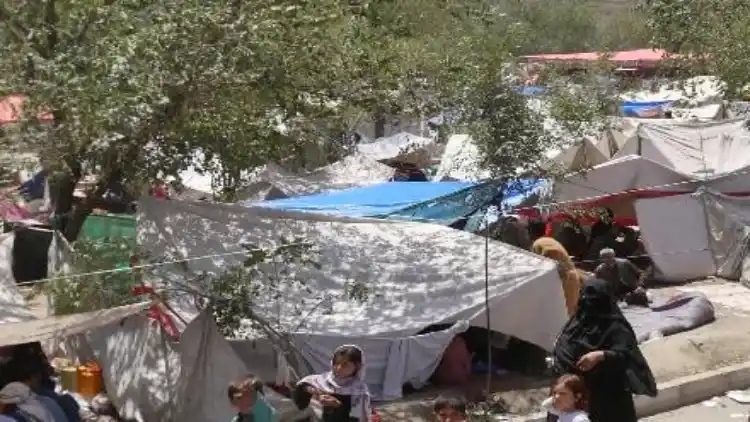
Shantanu Mukharji
Pakistan continues to be the villain as the Taliban is surging and making territorial gains making tens of thousands of Afghan families flee towards Kabul for safety. Meanwhile, Kunduz, home to 2,70,000 people and a strategic town has become vulnerable. Why is Pakistan a villain? People in the know of the developments behind the scene say that the Taliban is playing a proxy for Pakistan in Afghanistan. President Ashraf Ghani had earlier accused Islamabad of facilitating a crossing over of about 10,000 jihadis in Afghanistan. It’s no secret that the Taliban has regularly received training in arms handling and logistic support from the Pakistani military as the latter has a grand design of helping the Taliban annexe territories. In the long run, Islamabad feels this way it can have a grip over Afghanistan.
With a guilt complex, Pakistan Foreign Minister Shah Mahmood Qureshi, a known India basher and China lover lamented that Pakistan was being made a scapegoat for the mistakes committed by Afghanistan. Qureshi claimed that Pakistan was paying a heavy price as it had already suffered over 80,000 casualties (In the America led war against terrorism). He even said that Pakistan never favoured a military takeover in Afghanistan and preferred a civilian and elected government.
This, analysts say, is a whitewash to cover up Pakistan’s dirty hand in supporting the Taliban primarily to have a favourable and anti-India government in Kabul ignoring the consequences of a regressive Taliban government with a medieval mindset in the saddle. Qureshi averred that Pakistan wanted to play the role of a facilitator and not a guarantor in ensuring peace in Afghanistan. Such a statement, ostensibly a cover-up exercise, to extricate Pakistan as a collaborator of the Taliban, further confirms its villainous role. Pakistan Foreign Office in general, and the Foreign Minister in particular, are believed to be edgy over the reports that the Indian External Affairs Minister, S Jaishankar is scheduled to address the UNSC on August 18 and 19. They apprehend that India will further expose their country’s support to the Taliban in Afghanistan.
More significantly, criticizing India for its role as the President of the United Nations Security Council (UNSC), Qureshi blamed India for disallowing discussion on Afghanistan. This came in handy for India as it didn’t go well with the audience. Qureshi’s argument, as always, was feeble and bereft of reasoning. Not deterred by lack of response to his anti-India rhetoric, Qureshi now blamed India for terror assaults in Quetta, Casiore and Dasu.
In the meantime, Doha is bracing up to host a fresh round of talks of stakeholders on Afghanistan. Mainly, the Afghan government proposed that the Taliban could share power in Kabul to which the response is yet to come. However, any concrete outcome of the meeting is unlikely as the Taliban continues to surge and gain more territories.
What Pakistan is not trying to comprehend is that if the radicalised Taliban assumes full power in Kabul, it’s Pakistan that will be hurt the most. It will have to take the brunt of the consequences.
Pakistan has not learnt its lessons from recent history. During the Soviet occupation of Afghanistan, Pakistan raised the Taliban with the help of the US. That eventually gave birth to several ultra-terror groups like Lashkar-e-Toiba, Jaish-e-Mohammed and multiple of their affiliates. The Soviets withdrew alright but Pakistan continues to struggle to rid of the homegrown terror outfits that over the years became unwieldy. Also, Pakistan’s name in the grey list of the FATF and the country being branded as a terror state has much to do with this phenomenon.
Pakistan or its deep state’s rejoicing over the Taliban's surge will prove transient. It will evaporate soon when a resurgent Taliban starts targeting Pakistan by first getting support from religious extremists. This scenario will only push Pakistan backwards as against Prime Minister Imran Khan’s dreams of Naya Pakistan. This month also marks three years of Imran Khan in office. August is also the month when Pakistan was born. The same month also saw the end of the brutal rule of military dictator Gen Zia ul Haq.
It would perhaps be good for Pakistan if it sides with the Afghan government in dealing a blow to the Taliban and supports the idea of an elected government in Kabul. It’s a golden opportunity for Pakistan to prove its friendship with Afghanistan rather than bring India in between. If Pakistan doesn’t detract from its selfish and parochial stand on Taliban, it will suffer and pay an exorbitant price for misadventure.
(Writer is a retired IPS officer, a security analyst and a former National Security Advisor to the Prime Minister of Mauritius. Views are personal)
